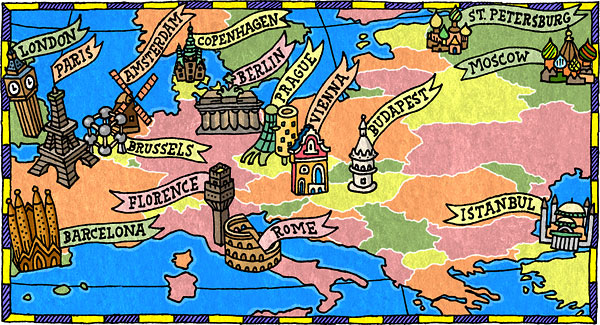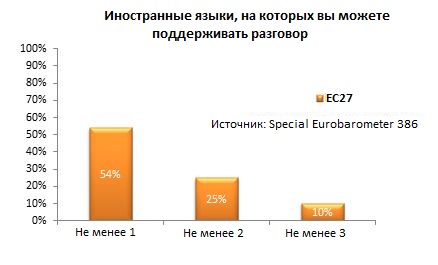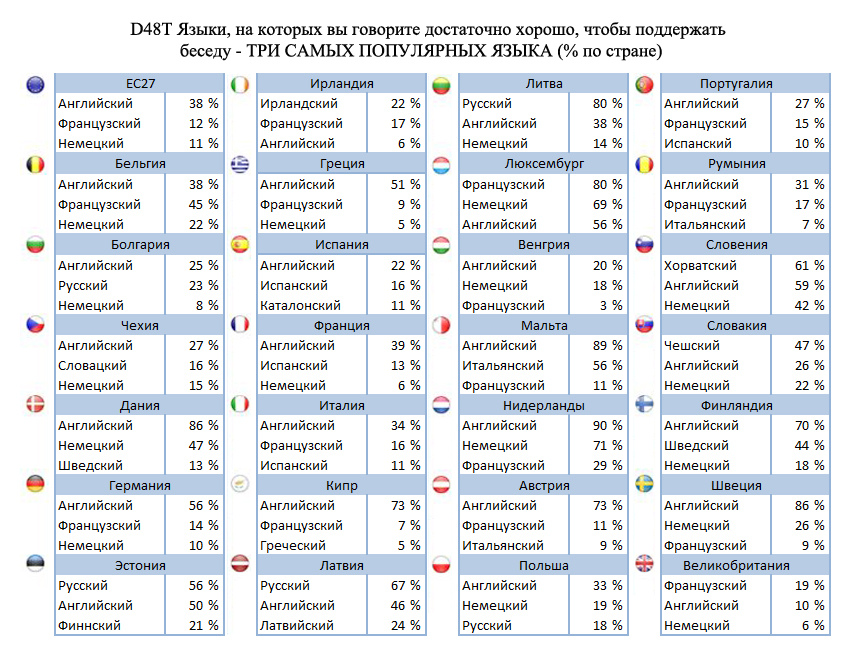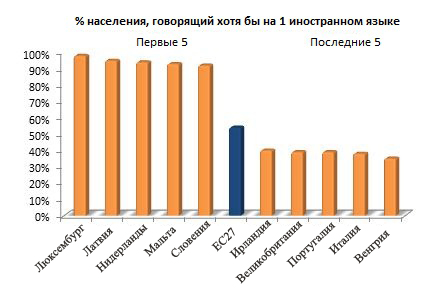Languages in Europe: when does translation make sense?

Europe is a region where you can meet so many languages and even more polyglot inhabitants. There are 23 officially recognized languages and 60 regional dialects. In addition, many migrants live in the EU, which means that you can hear quite exotic speech on the streets of European cities. All this is reported in the European Commission's Europeans and Their Languages report for 2012.
And how in this chaos to determine which languages it is advisable to translate into which languages and not?
Below we have collected a number of information about how Europeans use and perceive languages. The data from the aforementioned report on the 27 EU member states were collected by TNS Opinion & Social Network on the instructions of the European Commission.
')
Transferred to Alconost .
There are not so many polyglots in Europe, as is commonly believed
According to the report, 54% of Europeans are able to keep up their conversation in at least one non-native language. 25% speak two foreign languages, and 10% of European citizens know at least three foreign languages.

If you compare the results of the report with data from around the world, it may seem that polyglots in Europe are missing. However, the same figures show that almost half of the inhabitants of the region with a population of 740 million people know only their native language. Moreover, when respondents answered the question whether they could communicate in at least one foreign language online, the number of respondents positively decreased to 39%. In other words, less than four out of ten Europeans know a foreign language well enough to communicate on a network. If this foreign language is English (the most common in the EU), then only 26% of the population can speak it.
Add to this data the information from the previous report: the overwhelming number of Europeans (9 out of 10) prefers to visit sites in their native language. Thus, if you do not have a version of the site, say, in English, you will lose a significant part of the audience.
What foreign languages are most common in EU countries?
In 19 of the 25 EU member states (excluding the UK and Ireland), English is the most popular foreign language. English is not just spoken most often - it is also considered the most useful. 67% of Europeans call English one of the two foreign languages that should be studied first. According to this parameter, English simply defeated its closest rivals - German (17%), French (16%), Spanish (14%) and Chinese (6%) languages.
French and German are the next most popular languages after English. However, from surveys it became apparent that in 2005 these languages were considered much more useful. In other words, people in Europe today give them less importance.

Knowledge of languages in different countries
The image shows that in different European countries the percentage of people who know foreign languages is very different. To demonstrate the difference even more clearly, we compared five polyglot countries with five countries lagging behind in this issue:

This information will help determine whether the translation of the site into other languages will pay off. For example, you most likely will not get tangible benefits from translation from English if you promote your website in Holland. However, you should definitely do this if you plan to seize the market of Hungary, Italy or Portugal.
In favor of multilingual, but not to the detriment of the native language
Europeans are very positive about learning languages. 8 out of 10 people here believe that knowing a foreign language is very useful, and that everyone in the EU should learn at least one.
Most of the inhabitants of the region know one of the "pan-European" languages. Nevertheless, 81% of respondents believe that all languages should be treated equally. This is a very important trend - the idea of equality of languages has become very popular compared to the 2005 survey. The report says: "(...) although most Europeans support the view that everyone in the EU should know a common language, this does not mean that citizens want the advantages of a language over others."
Multilingual DOES NOT develop
There is no doubt that multilingualism helps to ensure European integration. It is also impossible to underestimate its impact on job mobility, competitiveness and, as a result, the economic efficiency of the European Union on the world market.
Despite the fact that the Internet is often (and rightfully) considered to be a force that can unite people geographically, culturally and linguistically, "now there are no signs that the percentage of multilingual citizens in the EU is growing."
In fact, survey results show a reverse process. The percentage of Europeans claiming to know foreign languages has slightly decreased compared to 2005. This is due to a noticeable reduction in the number of citizens who know Russian and German in the countries of Central and Eastern Europe (such as Slovakia, the Czech Republic, Bulgaria and Hungary).
At the same time, the report shows that, compared with 2005, EU citizens began to communicate 10% more often on the Internet in foreign languages. Perhaps this is the most significant change in the figures for the specified period.
Summing up
Each EU country is responsible for its own language and education policies. Therefore, until a truly united, "speaking a common language" of Europe, so far for us, as for the stars.
Also it is necessary to take into account that knowledge of a foreign language does not imply a desire to speak it, just like searching for foreign products and services in the network. Therefore, when promoting your business in the EU, keep in mind that there is no golden rule, common language or common culture.
However, it would be absurd and too expensive to translate your website into all languages present in the region. You can create groups of countries with similar linguistic and cultural characteristics to decide which translation you need. For example, the English site is suitable for the Netherlands and the Scandinavian countries, Russian for the entire Baltic, and so on. Where foreign languages are poorly known, you need to assess the economic potential of the country and compare it with the cost of localization. “Target” in some regions - such as Portugal, Hungary, Italy and Poland - may be a waste of time, money and effort.
Although this approach will not provide you with equal conditions with local competitors, you can benefit from the scale of the promotion. If you want to make the best impression on the inhabitants of the country, you should translate your website into their native language. Remember that in an international competition you need to become the best.
If you have any doubts whether the investment in the localization of your product will pay off - please contact us at info@alconost.com , and we will tell you the exact cost of the translation, which you can compare with the expected return.
About the translator
The article is translated in Alconost.
Alconost is engaged in the localization of applications, games and websites in 60 languages. Language translators, linguistic testing, cloud platform with API, continuous localization, 24/7 project managers, any formats of string resources.
We also make advertising and training videos - for websites selling, image, advertising, training, teasers, expliners, trailers for Google Play and the App Store.
Read more: https://alconost.com
Source: https://habr.com/ru/post/189194/
All Articles